
Hall Equaled 120H World Record In 1969
Erv Hall of Villanova started the excitement early at the 1969 NCAA Division I Outdoor Track & Field Championships.
In the first heat of the first track event of the first day, Hall equaled a world record of 13.2 in the 120-yard hurdles.
The record time caught everyone by surprise – including Hall.
As Tom Cushman of the Philadelphia Daily News reported, “Hall slumped onto a nearby bench, grinning broadly, shaking his head in disbelief. ‘It felt good. . . I thought it was fairly fast. . . but I can’t believe 13.2,’ he said. ‘Things like this can happen at the strangest times’.”
Hall came back the next day to win both his semifinal and the final in 13.3 – faster than the previous meet record of 13.4 that he had a share of from when he finished second at the 1968 NCAA meet.
Some observers believe credit for Hall’s fast times were due to the surface at Tennessee’s Tom Black Track, as the host site was sporting the same Tartan surface that was used the previous year at the Olympics in Mexico City.
Hall might have been more familiar with the surface than others – indeed, he was a silver medalist in the 1968 Olympics. Still, it was the same surface for everyone, and Hall won all three of his rounds in the 1969 NCAA meet by at least 0.2 seconds.
The NCAA and collegiate track & field will mark a momentous milestone in the spring of 2021 -- the 100th anniversary of the NCAA Championships and with that, the NCAA Track & Field Championships. In June 1921, the University of Chicago hosted the first track & field championships in NCAA history.
This point can’t be emphasized enough: Not only was the event the first for NCAA track & field, but the first championships for any sport under the sponsorship of the NCAA.
To celebrate, over each of the next 365 days, the U.S. Track & Field and Cross Country Coaches Association (USTFCCCA) will celebrate moments, student-athletes, and coaches that have made a century’s worth of championships special. From humble beginnings to important historical milestones to the modern-day, collegiate track & field has evolved with the American society.
The 2021 edition of the NCAA Division I Outdoor Track & Field Championships begin with preliminary round action on May 27-29 in Jacksonville, Fla., and College Station, Texas. The championships final site and culmination of the celebration is slated for June 9-12, 2021 at the newly rebuilt Hayward Field in Eugene, Ore.

Cal’s Hudson Wins Epic Triple Jump With World’s Best
On this day in 1987, Sheila Hudson of California set world best in Women’s Triple Jump at the NCAA Division I Outdoor Track & Field Championships when she bounded 13.78m (45-2½).
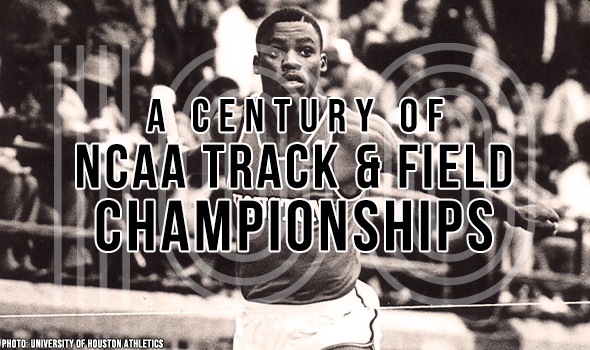
Track. Field. Houston’s Lewis Does It All!
On this day in 1981, Carl Lewis of Houston became the first athlete since Jesse Owens to win a track event and field event at the same NCAA Division I Outdoor Track & Field Championships.

UCLA Men’s 4×400 Clocks NCAA’s First Sub-3
On this day in 1988, the UCLA men’s 4×400 relay team became the first collegiate quartet to break three minutes, clocking 2:59.91 with Steve Lewis, Kevin Young, Danny Everett and Henry Thomas.
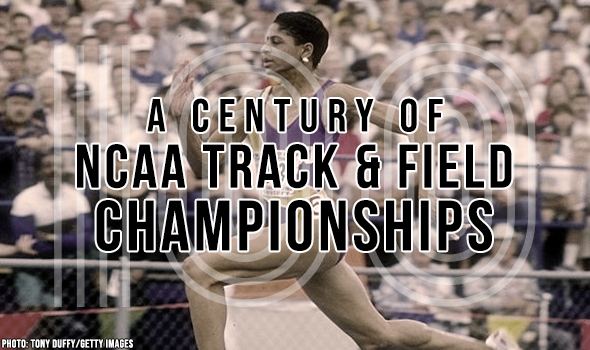
LSU’s Sowell Dominates 1989 NCAA Championships
On this day in 1989, Dawn Sowell of LSU culminated one of the most dominant performances in the history of the NCAA Outdoor Championships.

Givens’ Quad Leads Florida State to Team Title
On this day in 1984, Randy Givens of Florida State completed a remarkable – and still, unmatched – feat, winning a quadruple set of titles at the NCAA Division I Outdoor Track & Field Championships in Eugene, Ore.

Rono Rolls Into The Record Books
On this day in 1978, Henry Rono of Washington State became the first (and still only) man to set two different NCAA Championships meet records in distance races on the same day.
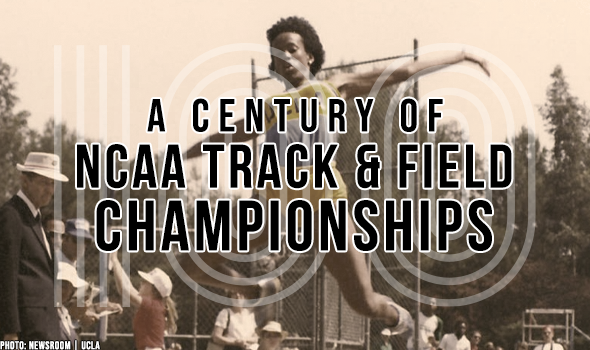
Jackie Joyner Doubles Down On Multi Crowns
On this day in 1983, Jackie Joyner of UCLA became the first woman to win an event twice at the NCAA Championships, claiming her second consecutive crown in the heptathlon with a then-collegiate-record-setting score of 6390 points.
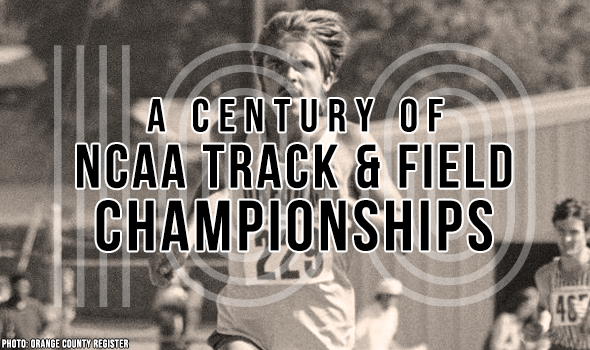
Connect Four: Prefontaine Makes History
Steve Prefontaine of Oregon became the first athlete to win titles in the same outdoor event four times, claiming the 3-mile/5000m from 1970-73.
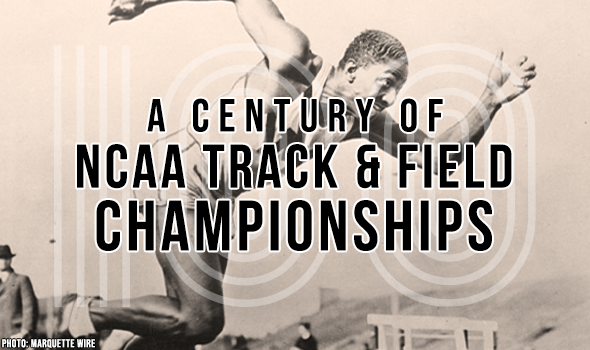
Ralph Metcalfe Is Mr. Triple-Double
Ralph Metcalfe, who was born on this day (May 29) in 1910, won three consecutive 100 and 200 titles while at Marquette from 1932-34, becoming the first athlete to win three NCAA titles in two separate events.

Georgia’s Orji Jump-Starts Record-Breaking Career
On this day in 2016, Keturah Orji of Georgia set her first collegiate record in the triple jump of 14.29m (46-10¾) at the NCAA Division I East Preliminary Round in Jacksonville, Florida.

